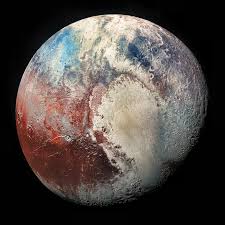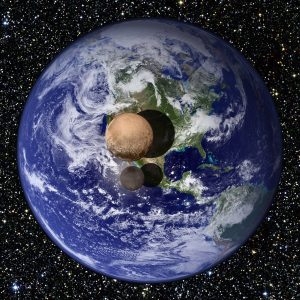
Tara O’Leary, Staff Writer|
A new study is forcing people to take another look at Pluto’s planetary status after it had been previously demoted to a dwarf planet in 2006. Lead scientist on the new research, Phillip Metzger, took a closer look at the history of our former planet and makes a strong argument as to why Pluto should be reinstated.
In 1930 the ninth planet from the sun was officially recognized, and it wasn’t until 1992 that this status started to be questioned. Pluto was a debatable topic amongst astronomers for years, but it wasn’t until 2005 that the debate truly became a serious matter. A new dwarf planet, Eris, was discovered. It was larger than Pluto and yet it didn’t earn planetary status. This led many to wonder if the small planet was worthy of its title.
The International Astronomical Union (IAU) was responsible for coming up with an answer to that question. In 2006 they defined a planet as “a celestial body that orbits the sun, is nearly round, and can clear the neighborhood around its orbit,” that last quality is what put Pluto in trouble. Clearing the neighborhood refers to a planet being able to knock debris out of the way as it fulfills its orbit.

The vote concerning Pluto’s status took place at the annual IAU meeting and our ninth planet was considered too small to clear its neighborhood, therefore demoting Pluto to a dwarf planet. The decision was an unpopular one amongst astronomers. Only 424 of the 13,000 IAU members voted, which left many without a voice. Since then, many different studies have taken place in order to regain Pluto.
In 2014, the Harvard Smithsonian Center for Astrophysics voted that Pluto should be considered a planet and, in 2015, NASA’s New Horizons spacecraft flew by Pluto and allowed astronomers to learn more about it. Astronomers now know that Pluto has methane ice dunes, snow covered mountain peaks, and possibly an underground ocean. This discovery leads some to believe that the only planet more complex than Pluto would be Earth.
Last May, research duo, David Grinspoon and Alan Stern proposed a much simpler planetary definition, stating that planets are “round objects in space that are smaller than stars.” This definition was considered too broad and would have left our solar system with over a hundred planets.
The generalized definitions and failed studies frustrated those in support of the IAU’s decision. Astronomer, Mike Brown has expressed his frustrations via Twitter, saying, “Pluto is still not a planet. Actually it never was. We just misunderstood it for 50 years.” He then continued his thoughts tweeting, “Nostalgia for Pluto is really not a very good planet argument, but that’s basically all there is.” Brown is one of the astronomers responsible for Pluto’s demotion and he certainly stands behind this decision, sporting a Twitter handle that reads @plutokiller and having written a memoir titled “How I Killed Pluto and Why It Had It Coming.”
The latest study, led by Metzger, comes from the scientific journal Icarus. The new research argues in Pluto’s favor with more than just nostalgia and generalized definitions. It leads with two centuries worth of research. Metzger states that the “clear the neighborhood” criteria declared by the IAU is dated. Only one study in the past 200 years has used clearing the neighborhood as a standard for planets and it was done in the early nineteenth century.
Metzger uses his new study to remind us that, in the 1950s astronomers said, what really determines a planet is how a celestial body is formed. He then proposes new criteria based on size, stating that a planet is considered big enough if its gravity allows it to become a spherical shape. This new criteria, if approved, would include Pluto as a planet.
Leave a Reply